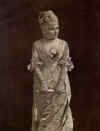











|
|
   |
Rose
Coghlan
(1853-1932)

|
-Photo-B&W-Resized.jpg)

|
"A
ripe and radiant beauty, buxom, blithe
and debonair, delightful in high
comedy and effective in serious
characters or in the high lights of
melodrama." George Odell
|
|

|
|
Coghlan,
Rose (1853-1932) was born in
Peterborough, England. Her father was
Francis Coghlan the publisher of Coghlan’s
Continental Guides and a friend of
Dickens. Her brother was Charles
Coghlan who was brought to America by
Augustine Daly to be apart of his
company. She made her theatrical debut
when she was a child as one of the
three sisters in a Scottish production
Macbeth. Soon after she acted
in support of Adelaide Neilson and J.E
Toole. Rose first came to America in
1871 to play in burlesque with Lydia
Thompson and her British Blondes. The
following year E.H. Sothern brought
the nineteen year old back to America.
During the 1872-73 season she appeared
in supporting roles with Wallack’s
company. With Sothern she acted in the
trinity of Dundreary comedies: Our
American Cousin, Brother Sam
and Dundreary Married and Settled.
Four years followed in England during
which time she acted with Charles
Mathews, Joseph Jefferson and Barry
Sullivan; toured the provinces in A
School for Scandal, Twelfth
Night and East Lynne; and
created Lady Manden in All For Her
and acted in it four hundred nights at
the St. James Theatre. She came back
to America and Wallack’s in 1877,
where she reigned as leading lady for
eleven years during the 1880’s until
the company disbanded in 1888. When
the celebrated company was assembled
to perform Hamlet on Mr.
Wallack’s retirement from the stage
on May 21, 1888, Miss Coghlan acted
the player Queen. Her Lady Teazle and
Rosalind were declared
"unsurpassed" on the
American stage. She appeared in
Boucicault’s Marriage, Sardou’s
Diplomacy and A Scrap of
Paper, Clarissa Harlowe, The
Silver King and Lady Clare.
During the 1890s and 1900s she
appeared mostly in England. But in
1893 she headed her own company and
produced the first American production
of Oscar Wilde’s A Woman of No
Importance, playing Mrs. Arbuthnot.
And in 1908 she toured the United
States in a controversial production
of Shaw’s Mrs. Warren’s
Profession. Afterwards she played
opposite John Drew and Mary Boland in
Summerset Maugham’s Jack Straw.
During the 1909-10 season she joined a
repertory company at the New Theatre
where she was seen as Mrs. Candour,
Mistress Page and Paulina. Her last
important roles were the Duchess of
Saurennes in Maugham’s Our
Betters (1917) and Madame Rabouin
in Deburau (1920). When she
retired in 1921 at the age of 68 she
had complete a stage career of more
than 52 years. |
|

|
|
(Click
on photo to enlarge) |
|

|

|

|
| Countess
Zicka in
Diplomacy (1877) |
Lady
Teazle at Wallack's |
Portrait |
 |
 |
 |
| in
As You Like It (1880) |
Portrait |
in
White Heather (1897) |
 |
 |
 |
| 1903 |
1911 |
in
Our Betters (1917) |
| |
 |
|
| |
As
Rosalind reciting the epilogue in the
1912 Silent film of
As You Like It |
|
 |
Joseph
Haworth & Rose Coghlan
 |
|
On July
24, 1892, Joe played
"Orlando" in As You
Like It opposite Rose Coghlan
in an open-air production on
the lawn at the Hotel Kenmawr in
Pittsburgh. This unique summer theatre
offering received major press coverage
in the New York Times. The Forest of
Arden was represented by three large
trees and evergreen branches placed
around the stage. There was a line of
incandescent lights on the ground
forming footlights and fifteen calcium
lamps on either side of the stage
flooded the playing area. A storm
erupted right before curtain, and a
steady rain fell throughout the first
act. The audience (some one thousand
from the highest circles of Pittsburgh
society) raised umbrellas and hung in
till the second act when the skies
cleared.
Joe was
quite famous for his
"Orlando." He played
romantic comedy lightly and
charmingly, and he was an excellent
physical actor who performed the
wrestling scene impressively. Joe’s
brother William played
"Oliver," the abusive older
brother of "Orlando."
William Haworth was then at the peak
of his fame as an actor having scored
a huge New York success in his play Ferncliff.
Miss Coghlan herself was in top form
that night in Pittsburgh. She was
frequently interrupted by enthusiastic
demonstrations from the audience, and
her voice projected in the open air as
clearly as in a theatre. |
|
 |
|
Top
of page |
|
|
|
 |